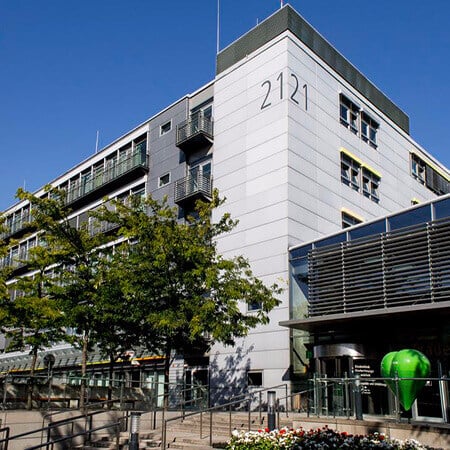Intensity-modulated Radiation Therapy (IMRT) for Prostate Cancer treatment in the Best Hospitals in the World
Treatment prices are regulated by national law of the corresponding countries, but can also include additional hospital coefficients. In order to receive the individual cost calculation, please send us the request and medical records.

Department of Radiation Therapy
According to the Focus magazine, the University Hospital of Ludwig Maximilian University of Munich is regularly ranked among the best medical institutions in Germany! The hospital is the largest multidisciplinary medical facility, as well as a leading research and training center in Germany and Europe. The hospital is proud of its bicentenary history and tirelessly confirms its primacy at the national and international levels. The outstanding quality of medical care is complemented by highly productive research activities, thanks to which many effective diagnostic and therapeutic methods, saving people’s lives, have been presented in medical practice.







Department of Radiation Therapy
According to the Focus magazine, the Department of Radiation Therapy ranks among the top German medical facilities in the area of its specialization! The department offers all types of modern radiation therapy for cancer treatment at the highest level of university medicine. The priorities of the department's work include the treatment of tumors of the gastrointestinal tract, urogenital system in men, gynecological tumors in women, oncopathologies of the nervous system, as well as head and neck tumors. Each department's specialist strives to ensure all the patients with the most effective and at the same time customized treatment. Due attention is also paid to radiation protection.






Department of Radiation Therapy, Radiation Oncology and Proton Therapy
The Department of Radiation Therapy, Radiation Oncology and Proton Therapy offers the full range of modern radiation therapy at the highest medical and technological level. Innovative proton therapy is also within the competence of the medical facility. As the largest medical facility of this kind in Eastern Saxony, the department annually admits about 2,300 cancer patients, 550 of whom are treated on an inpatient basis. In total, the department has about 110 employees, including 26 doctors, 14 physicists, 22 radiological assistants, 22 nurses and 28 employees of various profiles (in radiation biology research laboratories and other sections). The department's doctors cooperate closely with oncologists, chemotherapists and other specialists in related fields, since cancer patients usually require comprehensive treatment that combines several methods. In most cases, patients undergo radiation therapy on an outpatient basis, which eliminates the need for hospitalization. The main value of the department's medical team is the patient's health, so doctors always strive to provide qualified medical care that meets the individual needs of the patient.





Prostate cancer is one of the most common cancers among men. At the initial stages the disease practically does not manifest itself, the symptoms appear already at the advanced stages. The achievements of modern science make it possible to treat this disease at any stage. In particular, oncologists often turn to beam radiation therapy in the fight against prostate cancer.
Treatment of prostate cancer with IMRT
IMRT (intensity-modulated radiation therapy) has revolutionized the conventional medical treatment and dose calculation by making dose escalation possible. IMRT is optimized so that a high radiation dose is delivered to the tumor with minimal radiation delivery to healthy tissues.
Intensity-modulated radiation therapy (IMRT) is a type of radiation therapy. The method is based on the creation of a modulated external beam radiation in a pulsed mode to irradiate a tumor with varying degrees of intensity. The targeted accuracy and the penetration depth of external beam radiation are controlled using computer screening. This allows targeting the maximum dose of external beam radiation on the tumor and reducing the radiation exposure of the nearby healthy tissues.
The method has shown to be highly effective and reliable in the medical treatment of patients with a variety of tumors, including prostate cancer. The advantages of the method include the possibility of precise focusing of external beam radiation without involving healthy areas and organs, which significantly increased the effectiveness of treatment of patients with prostate cancer.
What is the difference between IMRT therapy and brachytherapy?
When conducting the external beam radiation therapy, specialized installations for irradiation are used. There is no direct contact of the patient's body with the irradiating device. In contact radiation therapy (brachytherapy), radiation therapy is carried out by placing a radioactive source directly into the tumor.
When is IMRT the right treatment for prostate cancer?
The prostate is located close to the rectum, bladder, penile bulb, and femoral heads which are at risk of receiving external beam radiation dose and subsequent toxicity against the background of the prostate cancer treatment. It has been demonstrated in clinical trials that IMRT decreases substantially the amount of unintentional radiation delivered to these structures.
In older patients, prostate cancer treatment can significantly impair quality of life, and recovery from medical treatment can be slow. Moreover, treatment complications and side effects are common. Prostate resection is associated with erectile dysfunction and urinary incontinence, for example, and irradiation can cause rectal bleeding.
Because the radiation dose that is delivered to healthy tissue is minimized with IMRT, higher and more effective doses of external beam radiation can be safely delivered to tumors with minimal side effects (as compared to traditional radiation therapy techniques). Compared to the conventional radiation therapy, IMRT requires somewhat longer clinical periods of daily treatment, as well as additional planning and safety performance assessments before a patient can begin clinical treatment.
Currently, IMRT is more actively used to treat prostate cancer, head and neck tumors, and tumors of the central nervous system. IMRT is also used occasionally to treat breast, thyroid, and lung cancers, gastrointestinal tumors, gynecological malignancies, and some specific types of sarcomas. IMRT may also be the treatment of choice for the medical treatment of malignant neoplasms in children.
How is the IMRT carried out?
Before planning prostate cancer treatment, a physical examination and medical history review will be conducted. Next, a treatment simulation session starts, which includes CT scanning. A small mark will be made on the patient's skin to help align and target the equipment. The external beam radiation oncologist uses this scan to elaborate an individual irradiation plan for the patient. In some cases, a mask or other device is used to keep the patient still during radiation therapy. Sometimes the patient should follow a certain bowel and bladder preparation regimen or to fast before the simulation and treatment. Intravenous contrast substance may be injected during the CT scan to help visualize the tumor better.
Occasionally, additional scanning procedures, including positron emission tomography (PET) and magnetic resonance imaging (MRI), might also be required for IMRT planning. These diagnostic images can be merged with the planning CT and help the external beam radiation oncologist determine the precise location of the target tumor.
During external beam radiation, a treatment machine will aim beams of radiation directly to the tumor. The beam passes through the body and destroys prostate cancer cells in its path.
Intensity-modulated radiation therapy (IMRT) uses images that are taken in real-time to deliver the external beam radiation to a tumor. As the natural movements of the body can make the prostate to move slightly during or between treatments, the healthcare team inserts markers into the prostate. These allow doctors to have a better view of the prostate during treatments. The external beam radiation machine moves around the body so the beams can be aimed from many angles. Besides, the shape of the beam changes while the prostate cancer treatment is being performed. This changes the intensity of the beam, which allows the doctor to target a tumor and spare healthy tissues.
A medical linear accelerator (LINAC) generates the photons, or X-rays, used in IMRT. The machine has the size of a small car. It is approximately 10 feet high and 15 feet long. During the treatment, the patient must lie still. The intensity of each external beam radiation dose is dynamically varied according to the treatment plan. The patient will not feel any pain while the external beam radiation is performed, but will hear noise from the machine, and may smell an odor from the electronic equipment, or see the warning indicator light. The noises and odors from the machine are normal. The patient will be in the room alone during treatment but he is constantly monitored by the external beam radiation therapists from outside the treatment room. The time in the treatment room depends on the specific plan but usually it is between 15 minutes and one hour.
As with other external beam radiation therapy treatments, there is no pain expected during the prostate cancer treatments with IMRT. However, the machine can be stopped if a patient experiences discomfort due to the treatment position or positioning devices. As prostate cancer treatment continues, some patients may experience treatment-related side effects. The nature of the side effects depends on the state of the normal tissue structures near the tumor that are being irradiated. The external beam radiation oncologist and the nurse discuss with the patient potential side effects and the management of those side effects.
You may receive external beam radiation therapy either alone or in combination with hormone therapy. Depending on the stage of prostate cancer, your doctor may recommend hormonal therapy in combination with radiation therapy. The goal of hormonal therapy is to shrink the prostate gland and prevent prostate cancer from growing to help make the treatment more effective.
Side effects of IMRT
Changes in the urinary system, such as:
- Difficulty urinating
- Increased frequency of urination
- Sudden urge to urinate
- Burning sensation when urinating
Bowel changes, such as:
- More frequent bowel movements
- Worsening of hemorrhoid symptoms
- Rectal discomfort
- Mild rectal bleeding
- Increased bloating
In some prostate cancer patients, after the end of external beam radiation treatment changes in sexual function may appear:
- Erectile dysfunction
- Change in the sensation of orgasm
- Changes in the amount or consistency of ejaculate
These changes in the sexual sphere can occur over many months or even years after treatment. It is important to study the information on treatments for erectile dysfunction.
Benefits of intensity-modulated radiation therapy (IMRT)
A recent systematic review of data from 13 studies representing 5,768 patients suggests that IMRT may be appropriate for patients with moderate or high-grade prostate tumors because it appears to spare rectal tissue from unnecessary irradiation. This results in fewer complications, such as rectal bleeding, pain, and uncontrolled defecation.
A separate systematic review that examined prostate cancer information from 16 studies also found reduced toxicity with IMRT but noted that evidence for local tumor control and overall patient survival was generally inconclusive. Significantly decreased gastrointestinal or genitourinary toxic effects were reported for the IMRT groups.
The cost of IMRT for prostate cancer
With Booking Health services, you can book IMRT for prostate cancer at an affordable price. The cost of the procedure varies in different countries. We can arrange a trip for external beam radiation therapy at a fair price. The cost of IMRT for prostate cancer goes as follows:
- Germany – from 16,000 EUR
- Turkey – from 13,000 EUR
- India – from 12,300 EUR
Where can I undergo IMRT for prostate cancer treatment abroad?
Among foreign hospitals, the best success rates in IMRT for prostate cancer treatment are demonstrated by:
1. Medicana International Ankara Hospital, Department of Radiation Oncology, and CyberKnife Treatment. The department offers cutting-edge methods of radiation oncology for the treatment of all types of tumors. It specializes in intensity-modulated radiation therapy, intraoperative radiation therapy, CyberKnife treatments, brachytherapy, and other treatments.
2. University Hospital of Ludwig Maximillian University of Munich, Department of Radiation Therapy and Radiation Oncology. The department ranks among the TOP German departments specializing in radiation therapy. It offers all modern services in radiation therapy, including special treatments like intensity-modulated radiation therapy, image-guided radiation therapy, whole-body irradiation, and others.
3. University Hospital Carl Gustav Carus Dresden, Department of Radiation Therapy, Radiation Oncology, and Proton Therapy. The department ranks among the TOP German medical facilities specializing in radiation therapy. As the largest medical institution of its kind in Eastern Saxony, the department provides treatment for about 2,300 cancer patients each year.
How can I undergo IMRT treatment abroad?
The self-organization of IMRT treatment abroad can be overwhelming. It requires specific knowledge and experience in medical tourism. It is safer, easier, and less stressful to shift some responsibility onto a medical tourism agency.
Booking Health is the largest and most transparent medical tourism agency in the world. Medical treatment abroad is arranged due to the direct cooperation with leading foreign hospitals.
Booking Health provides the following services:
- Selection of treatment program and medical facility
- Communication with the clinic
- Information on the overall cost of radiation therapy procedures
- Translation of medical documents
- Help in applying for a visa for the patient and accompanying person
- Flight and accommodation booking
- Interpreting services
To undergo prostate cancer treatment abroad for a reasonable price, please leave a request on our website. The medical tourism manager will contact you within a few hours and provide you with the necessary information.

